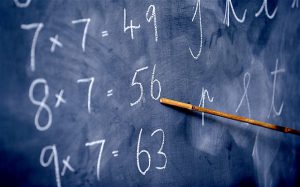We are passionate about Maths at Bishopton Centre. We firmly believe that a sound understanding of mathematics empowers and enables children to grow in confidence and to make informed choices throughout their lives.
The intent of the Mathematics curriculum is to be designed to be accessible to all and maximise the development of every child’s ability and academic achievement. We deliver lessons that are creative and engaging. We want children to make rich connections across mathematical ideas to develop fluency, mathematical reasoning and competence in solving increasingly sophisticated problems. We intend for our pupils to be able to apply their mathematical knowledge to science and other subjects. We want children to realise that mathematics has been developed over centuries, providing the solution to some of history’s most intriguing problems. We want them to know that it is essential to everyday life, critical to science, technology and engineering, and necessary for financial literacy and most forms of employment. As our pupils progress, we intend for our pupils to be able to understand the world, have the ability to reason mathematically, have an appreciation of the beauty and power of mathematics, and a sense of enjoyment and curiosity about the subject.

In Key Stage 3 all of the students follow the National Curriculum aims and objectives throughout. Targets are identified by professional teacher judgement from the Core Maths skills ‘Progression Grids’ for each Maths topic i.e. Fractions, Decimals and Percentages etc. Students will then work towards their individual targets set and are assessed through APP tasks, Formative and Summative assessments.
At the end of year 9, student’s progression grids will be passed onto the KS4 staff.
The aim is to prepare students for the demands and rigours of GCSE and to introduce some of the techniques for interpreting the more complex questions that are typically found in these examinations.
Following on from KS3 when a student arrives in KS4 they follow the Edexcel GCSE specification. This is a two-year programme of study and is examined at the end of year 11 with three exams. Each exam is 1 hour and 30 minutes long. One exam is non-calculator and two exams are with a calculator. Some questions will draw together elements of maths from different topic areas.
The GCSE subject content of this specification matches that set out in the Department for Education’s Mathematics GCSE subject content and assessment objectives document. The content has been organised into broad topic areas as follows:
At Bishopton Centre at Key Stage 4 we also follow a curriculum in Functional Skills based around the AQA Functional Skills syllabus including a focus on numeracy skills in a variety of workplace situations. This allows us to focus on maximising the numeracy skills of our pupils, often through ‘real world’ examples and ensures that no students leave Bishopton Centre without the numeracy skills they need. Most students will achieve Functional Skills qualifications and a GCSE in the process, ensuring students are proficient in both the mental and written calculations they will need as an adult, whilst also enabling them to access a wider range of post-16 provision.
Maths is very important in many job roles and will help you be successful in your future employment choices, the majority of employers are looking for at least a GCSE grade 4 in each subject. Maths skills could be the difference between you getting the job or promotion you want or not. People with good GCSE grades in maths also earn approximately £2,000 more than those who don’t and you’re more likely to get into university with a grade 4 in Maths.
Maths skills help you communicate with and understand the world around you, it is impossible to go a day without using maths skills, and a good level of understanding means that you can have more control over things like your finances, communication, and you can gain a better understanding of issues such as politics and current affairs.
Maths is good for your health. Studies show that higher levels of numeracy skills have a positive impact on your mental health and are linked to better health and a longer lifespan.